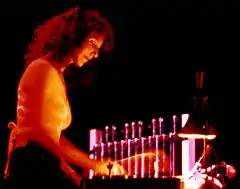Ruth Underwood
Ruth Underwood (born Ruth Komanoff; May 23, 1946) is a musician best known for playing xylophone, marimba, vibraphone, and other percussion instruments in Frank Zappa and the Mothers of Invention. She collaborated with the Mothers of Invention from 1972 to 1977.
Ruth Underwood | |
|---|---|
 Ruth Underwood playing at a Frank Zappa concert, ca. 1975 | |
| Background information | |
| Birth name | Ruth Komanoff |
| Born | 23 May 1946 |
| Genres | Jazz-rock/rock |
| Occupation(s) | Musician, composer |
| Instruments | Xylophone, marimba, vibraphone, harp, piano, synthesizer |
| Years active | 1967–1982 |
| Labels | Philips Records, |
| Associated acts | Frank Zappa and the Mothers of Invention |
Biography and career
Underwood began her music training in the classical tradition, studying both at Ithaca College under Warren Benson and at Juilliard under Saul Goodman. Throughout 1967, she kept a regular attendance at the Garrick Theater in New York City when Frank Zappa and The Mothers of Invention was the resident band. This resulted in her association with Zappa beginning in December 1967.
Oh, I was probably one of those rather stiff people from the suburbs - I think some of us did understand, and we kept coming back for more, and more, and more. I remember being very upset when they finally finished their stint at the Garrick Theatre and went back to L.A. I felt as if the real heart had gone out of New York City, and I had to get back on with my conservatory music training life, which seemed very dull after this.[1]
She used both her birth name, Ruth Komanoff, and her married name professionally. In May 1969 she married Ian Underwood, a fellow Zappa musician. They divorced in 1986. Underwood also appeared on drums with a rock group named The Hamilton Face Band during 1969, appearing on some of their recordings released by Philips Records and Bell Records.
Underwood performed in more than twenty recordings with Zappa or Mothers. Examples of her virtuosity can be heard on tracks including the "Rollo Interior interlude" from "St. Alfonzo's Pancake Breakfast", from the Apostrophe (') album (1974). Equally impressive work is documented on Roxy & Elsewhere (1974) and on "Inca Roads", the opening track on One Size Fits All (1975). Some glimpses of Underwood in action can be seen in the Zappa movie 200 Motels (1971), and the Dub Room Special DVD, which includes performances from the KCET Special A Token Of His Extreme. She also features in the film of the Roxy performances.
During the 1970s Underwood collaborated in sessions for a small number of other performers, most notably the band Ambrosia, Jasun Martz, jazz-keyboardist George Duke, the latter a Zappa bandmate, and Terry Bozzio, another Zappa bandmate.[2] By some accounts (which are vague), she retired from performing by about 1980, concentrating instead on her family and raising two children, both of whom have become accomplished classical musicians.
In a 1993 interview she revealed that she played on one final session for Zappa shortly before his death from cancer in December of that year. She is credited as a composer for that recording.[3]
A couple of years ago, when I heard that Frank was ill, I called him up. For 14 years we had no contact at all. He invited me to the house and we enjoyed some really nice visits with each other. Last June ('93) he called and asked if he could sample some of my stuff. I was shocked because I hadn't touched a pair of mallets since March of '77. I ended up practicing for 14 hours, which was all the time I could get together in the context of my life now. I spent four days at Frank's house sampling. This was really a miracle for me - that I could be reunited with him and still have something to offer.
In 2008, she commissioned Gordon Stout to write a work for Nexus. According to an article about the work that was published in 2009, "Gordon Stout: New work for NEXUS (2009)". Retrieved 2016-11-19.:
She is the mother of two children, both musicians and both college students. Still living in Los Angeles, Ruth devotes her spare time to giving free music lessons to children who could not otherwise afford to study.
Movie appearances
References
- Frank Zappa. The Late Show. London: BBC. July 23, 1993. Event occurs at 19:08. OCLC 263565757.
- https://www.allmusic.com/artist/ruth-underwood-mn0000765804
- https://www.allmusic.com/artist/ruth-underwood-mn0000765804/credits
